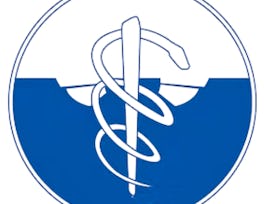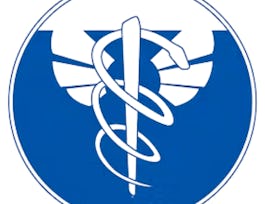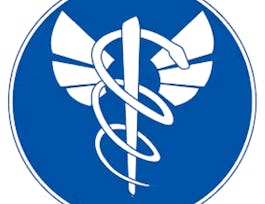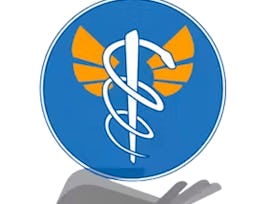In this course, you will develop the knowledge and skills to assess and stabilize certain types of patients for transport. By the end of this course, you will be able to: 1) assess a basic medical patient 2) describe general pharmacologic principles and the skills associated with medication administration, 3) explain airway physiology, the assessment of the airway and available interventions for airway management, 4) identify, assess and formulate a plan to stabilize a patient with a respiratory emergency for transport, and 5) identify, assess and formulate a plan to stabilize a patient with a cardiovascular emergency for transport. 6) describe the most common neurologic and endocrine emergencies and what you can do for them as an EMT.


Medical Emergencies: Airway, Breathing, and Circulation
This course is part of Become an EMT Specialization
Taught in English
Some content may not be translated



Instructors: Angela Wright, MD
37,669 already enrolled
Included with 
Course
(749 reviews)
96%
Details to know

Add to your LinkedIn profile
8 quizzes
Course
(749 reviews)
96%
See how employees at top companies are mastering in-demand skills

Build your subject-matter expertise
- Learn new concepts from industry experts
- Gain a foundational understanding of a subject or tool
- Develop job-relevant skills with hands-on projects
- Earn a shareable career certificate


Earn a career certificate
Add this credential to your LinkedIn profile, resume, or CV
Share it on social media and in your performance review

There are 5 modules in this course
At the end of this module, you will be able to: 1) apply a systematic approach of patient assessment specifically to a patient with a medical complaint, 2) explain the basic principles of pharmacology including forms of medications, routes of medication administration, and to define the basic components of a drug profile and, 3) organize the appropriate steps when administering any medication including the five rights, premedication evaluation and post administration evaluation.
What's included
9 videos4 readings2 quizzes1 discussion prompt
Assessment of and management of the airway is critical in patient care. This module is all about the airway. In this module you will 1) identify the most important anatomic and physiologic portions of the respiratory system, 2) distinguish between normal and abnormal in the setting of airway and breathing 3) learn how and when to use the various tools you will have as an EMT to stabilize or improve the respiratory conditions in diverse patients.
What's included
14 videos5 readings1 quiz
In this module, we will dig a little deeper into the respiratory system now that you have an overview of how this system works and its importance. By the end of this module you will 1) start to classify types of symptoms and triage them on scene 2) distinguish between an upper and lower airway issues 3) Develop the framework to assess acute and chronic respiratory diseases. 4) Work through the primary and secondary surveys you will perform when faced with a patient with many different respiratory complaints.
What's included
10 videos3 readings1 quiz
In this module we cover a system closely related to the respiratory system- the cardiovascular system. In this module you will learn 1) the intricacies of the anatomy and physiology of the cardiovascular system. 2) a few of the most common diseases that affect the cardiovascular system 3) how to approach and assess patients with cardiac complaints with an emphasis on patients with possible acute coronary syndromes 4) the differences in treatment for various cardiac complaints.
What's included
13 videos2 readings2 quizzes
This module encompasses the neurological and endocrine systems. While these may not initially sound related, in this module you will learn how to assess patients with altered mental status and primary neurological complaints. To get to that point, you will: 1) learn the anatomy and physiology of the nervous system and the endocrine system. 2) learn about specific diseases or symptoms of diseases that affect the brain and mental status of a patient. 3) apply this background knowledge to the completing the primary and secondary assessments of a patients with stroke like symptoms, headaches, seizures and with altered mental status.
What's included
11 videos3 readings2 quizzes
Instructors


Offered by
Recommended if you're interested in Patient Care

University of Colorado System

University of Colorado System

University of Colorado System

University of Colorado System
Why people choose Coursera for their career




Learner reviews
Showing 3 of 749
749 reviews
- 5 stars
82.95%
- 4 stars
13.31%
- 3 stars
2.13%
- 2 stars
0.66%
- 1 star
0.93%
New to Patient Care? Start here.

Open new doors with Coursera Plus
Unlimited access to 7,000+ world-class courses, hands-on projects, and job-ready certificate programs - all included in your subscription
Advance your career with an online degree
Earn a degree from world-class universities - 100% online
Join over 3,400 global companies that choose Coursera for Business
Upskill your employees to excel in the digital economy
Frequently asked questions
Access to lectures and assignments depends on your type of enrollment. If you take a course in audit mode, you will be able to see most course materials for free. To access graded assignments and to earn a Certificate, you will need to purchase the Certificate experience, during or after your audit. If you don't see the audit option:
The course may not offer an audit option. You can try a Free Trial instead, or apply for Financial Aid.
The course may offer 'Full Course, No Certificate' instead. This option lets you see all course materials, submit required assessments, and get a final grade. This also means that you will not be able to purchase a Certificate experience.
When you enroll in the course, you get access to all of the courses in the Specialization, and you earn a certificate when you complete the work. Your electronic Certificate will be added to your Accomplishments page - from there, you can print your Certificate or add it to your LinkedIn profile. If you only want to read and view the course content, you can audit the course for free.
If you subscribed, you get a 7-day free trial during which you can cancel at no penalty. After that, we don’t give refunds, but you can cancel your subscription at any time. See our full refund policy.


